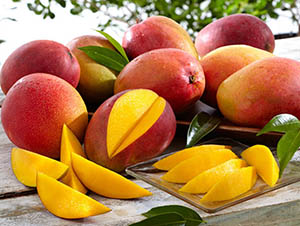Succulent, sweet, juicy, each mango is a masterwork of nature for its aroma. Its delicate flavor along with its dietary and therapeutic properties make this tropical fruit a must-have for anyone who loves health and wellness. Mango–beloved fruit, it certainly is to many.
Health properties of the Mango:
The mango pulp contains 81.7% water. It contains 15.2 grams of carbohydrates per 100 gram of its edible portion. Its sugars consist of glucose, fructose and saccharose.
- Vitamin A
The most notable nutrient in the mango is Vitamin A. A mango weighing 100 g contains 1, 295 IU of vitamin A. The U.S. recommended dietary allowance (RDA) for adults is as follows: 900 micrograms daily (3,000 IU) for men and 700 micrograms daily (2,300 IU) for women. Hence, a 300 g mango provides the recommended dietary allowance.
The mango is also high in carotenoids which give it its bright yellow-orange color. These carotenoids are potent antioxidants that neutralize oxidizing free radicals which cause cellular aging. - Vitamin C
The mango is also a good source of vitamin C. - Vitamin E
The mango is one of the richest fruit in this vitamin. Vitamin E functions mainly as an antioxidant. - Vitamin B
The mango is also high in the stress vitamins B1, B2, B6, and niacin. These vitamins help in relieving stress.POEM-Mango-Beloved Fruit
The enzymes contained in mangoes make this fruit an excellent compliment with meat:
Click here for the other recipes.
The mango is a perfect fruit for breakfast, lunch or dinner. It inspires creativity. It stimulates the senses. But most of all, its health benefits make this fruit certainly a beloved one by many all around the world. No wonder it is a popular imported fruit. Eat it raw, add it to salads for an added sweetness, eat it grilled, or with your favorite grilled food. I can assure you, you will not be disappointed.
Reference: Encyclopedia of Foods and their Healing Power






